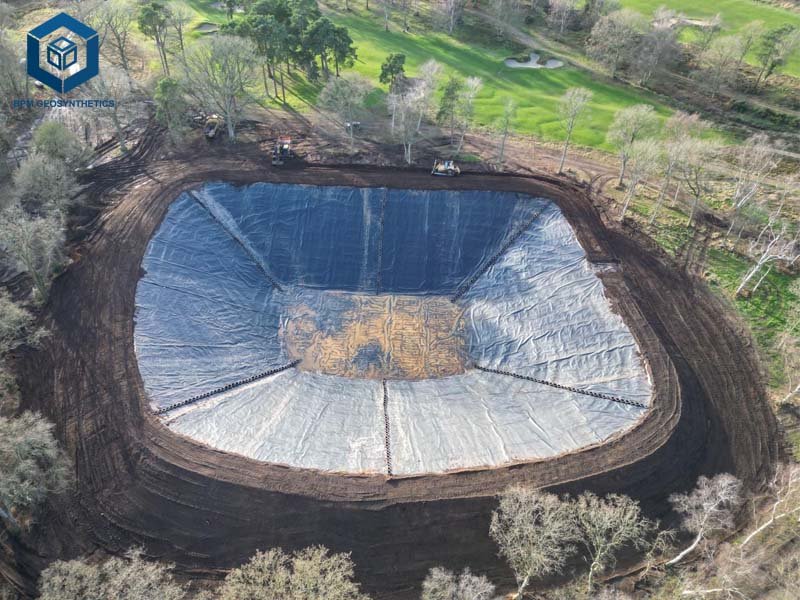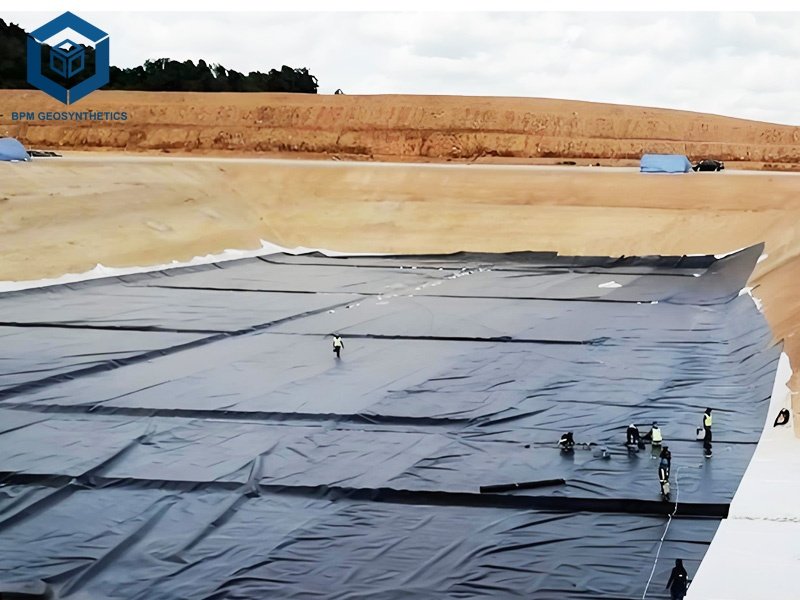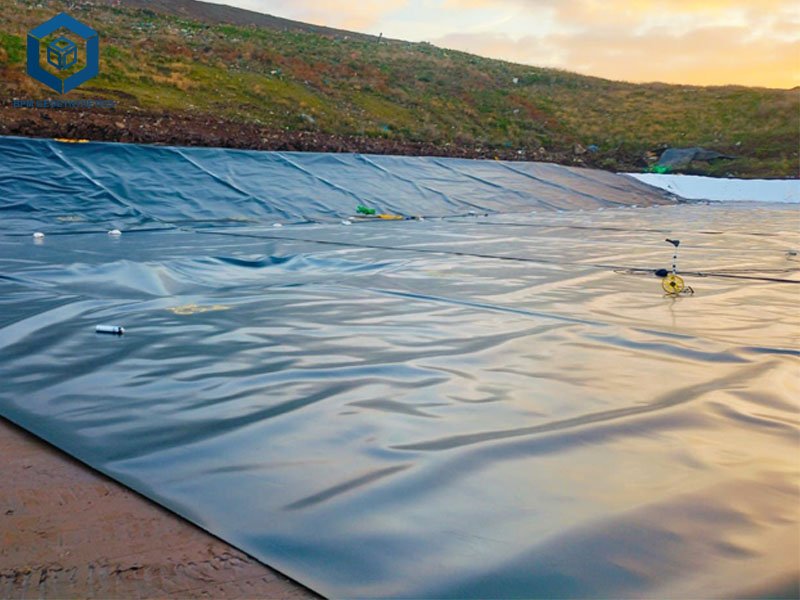High-Density Polyethylene (HDPE) geomembrane sheets have become an essential component in modern environmental protection and civil engineering projects. These impermeable plastic liners serve as reliable barriers against fluid migration in applications ranging from landfill containment to water storage systems. Selecting the best HDPE geomembrane sheet requires careful consideration of material properties, project requirements, and performance standards.
Understanding HDPE Geomembranes
HDPE geomembranes are synthetic membranes made from high-density polyethylene resin, designed to provide superior fluid containment and environmental protection. These engineered sheets have revolutionized containment systems with their exceptional durability, chemical resistance, and long service life.
1.The fundamental composition of HDPE geomembranes includes:
Polyethylene resin: The primary material that provides the membrane’s structural integrity
Carbon black: Typically added (2-3%) for UV stabilization and extended outdoor durability
Antioxidants: Protect against oxidative degradation over time
Stabilizers: Enhance resistance to environmental stressors
Premium HDPE geomembranes like those produced by BPM Geomembrane undergo rigorous quality control measures to ensure consistent thickness, uniform properties, and reliable performance in demanding applications. These membranes are manufactured through a process of extrusion and calendering, resulting in sheets with excellent tensile strength and low permeability.
2.Key Characteristics of the Best HDPE Geomembranes
When evaluating HDPE geomembrane quality, several critical performance characteristics should be examined:
2.1. Thickness and Density
Quality HDPE geomembranes typically range from 0.5mm to 3.0mm in thickness, with 1.0mm to 2.0mm being most common for standard applications. Thicker membranes (2.5mm+) are used in more demanding environments like landfill base liners. The density should be ≥0.940 g/cm³, with premium grades reaching 0.950-0.965 g/cm³for enhanced durability.
2.2. Tensile Properties
The best membranes exhibit:
Tensile strength: ≥25 MPa (ASTM D6693)
Elongation at break: ≥700% (indicating excellent flexibility)
Tear resistance: ≥125 N/mm (resists puncture during installation)
These properties ensure the membrane can withstand installation stresses and long-term loading without failure.

2.3. Chemical Resistance of HDPE Sheet
Premium HDPE geomembranes demonstrate exceptional resistance to:
Acids and alkalis (pH range 1-14)
Organic solvents
Salts and most industrial chemicals
Biological degradation
This makes them ideal for hazardous waste containment and industrial applications.
2.4. Environmental Stress Crack Resistance (ESCR)
High-quality membranes should have ESCR >1500 hours(ASTM D5397), indicating resistance to cracking under long-term stress. BPM Geomembrane products typically exceed this benchmark.
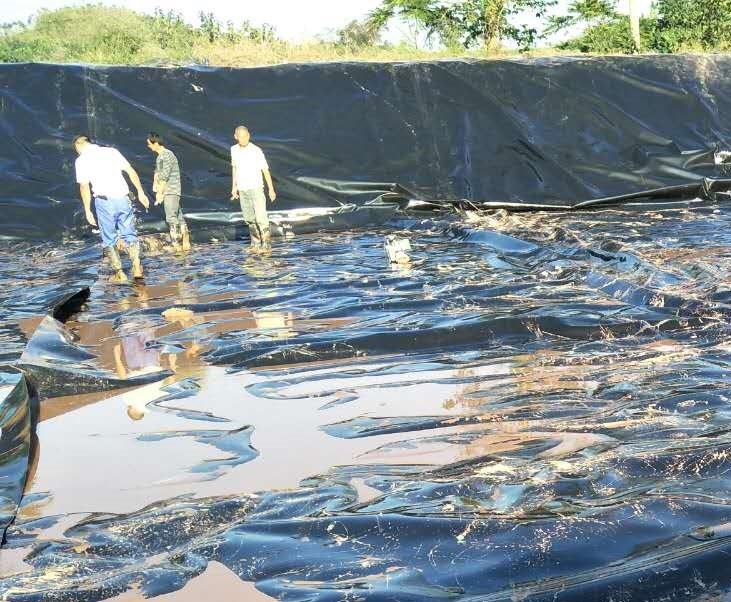
2.5. UV Resistance
With proper carbon black content (2-3%), quality HDPE geomembranes can withstand 20+ years of UV exposure without significant degradation.
Selecting the Right HDPE Geomembrane for Your Application
3.Choosing the best HDPE geomembrane requires matching product specifications to project requirements. Consider these key factors:
3.1. Project Type and Requirements
Different applications demand specific geomembrane properties:
Landfill liners: Require 1.5-3.0mm thickness, high chemical resistance, and excellent stress crack resistance. Research shows maximum tensile stress in landfill applications typically remains below 0.62 MPa , but membranes should have substantial safety margins.
Mining and industrial pond: Need 1.0-2.5mm thickness with specific chemical compatibility to contained materials.
Water reservoirs and canals: Typically use 0.75-1.5mm membranes with focus on UV stability and flexibility.
Agriculture (ponds, irrigation): Often utilize 0.5-1.0mm membranes balanced for cost and performance.
3.2. Site conditions influence on the selection of HDPE geomembrane sheet
Subgrade quality: Rougher subgrades require thicker membranes (≥1.5mm)
Temperature extremes: Affects thermal expansion/contraction considerations
Exposure conditions: UV exposure, potential for abrasion, etc.
Slope stability: Steep slopes (common in landfill applications) increase stress on the membrane. Studies show maximum stress often occurs at anchor trench locations.
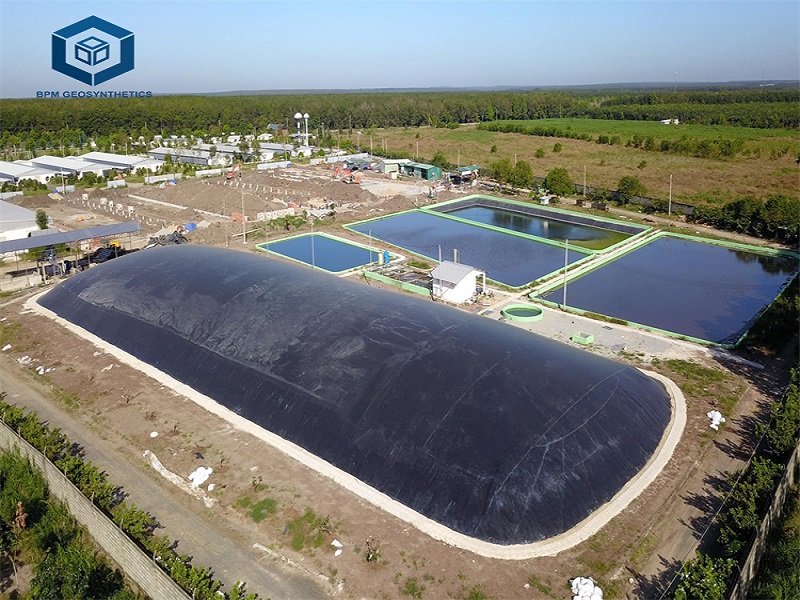
3.3. Material Specifications
Verify the geomembrane meets relevant standards:
GRI-GM13 (Geosynthetic Research Institute standard)
ASTM standards for geomembranes (D6392, D6693, etc.)
3.4. Manufacturer Reputation and Quality Assurance
Choose established manufacturers like BPM Geomembrane that provide:
Certificates of analysis for each production lot
Third-party testing results
Quality control documentation
Technical support for installation and design
4.Applications of HDPE Geomembranes
HDPE geomembranes serve critical functions across numerous industries:
4.1. Environmental Protection
Landfill liners and caps: Prevent leachate migration into groundwater. Research indicates HDPE membranes in landfills experience maximum stresses at anchor points (up to 0.62 MPa in steep slope conditions).
Containment ponds for industrial and mining waste
Remediation projects for contaminated sites
4.2. Water Management
Potable water storage: FDA-compliant grades available
Irrigation reservoirs
Wastewater treatment lagoons and tanks
Canals and waterways to prevent seepage
4.3. Energy Sector
Solar pond liners
Brine containment in lithium extraction
Oil and gas fluid containment
4.4. Agriculture
Pond liners for fish farming
Water conservationsystems
Manure storagefacilities
4.5. Civil Engineering
Tunnel waterproofing
Foundation moisture barriers
Roof gardens and green infrastructure
5.Why Choose BPM Geomembrane?
When selecting an HDPE geomembrane supplier, BPM Geomembrane stands out for several reasons:
A.Superior Material Quality: Uses premium-grade resins with optimal additive packages for long-term performance.
B.Consistent Manufacturing: Maintains tight thickness tolerances (±3%) and uniform properties throughout rolls.
C.Comprehensive Testing: Performs rigorous QA/QC including:
Melt index testing
Density verification
Tensile property testing
Puncture resistance evaluation
D.Technical Expertise: Provides engineering support for:
Design specifications
Installation guidance
Long-term performance predictions
E.Proven Performance: Membranes have demonstrated reliability in challenging environments including:
High-temperature applications
Chemical exposure conditions
UV-intensive climates
F.Certifications: Meets or exceeds all major international standards for geomembrane performance.
Conclusion
Selecting the best HDPE geomembrane sheet requires careful evaluation of material properties, project requirements, and manufacturer capabilities. The optimal choice will demonstrate:
– Appropriate thickness and density for the application
– Excellent mechanical properties (tensile strength, elongation, tear resistance)
– Superior chemical and environmental resistance
– Compliance with relevant industry standards
– Proven performance in similar applications
– Quality manufacturing and testing protocols
BPM innovative, high quality geomembranes include smooth HDPE gemomembrane liner, textured HDPE geomembrane, composite geomembrane Liner, geomembrana liner, geomembran liner, LDPE liner, LLDPE liner, PVC geomembrane liner, HDPE pond liner, LDPE pond liner, PVC pond liner, EPDM liner and more, which are your best choice for environmental, civil and industrial applications. Generally, geomembrane is manufactured with different colors such as black, white, blue or green for specific applications. Black geomembrane is the common geomembrane liner. Colored geomembrane is designed for specific projects.
As the largest geomembrane liner companies in China, BPM has more than 160 professional staff and 36,000 square meters géomembrane manufacturing factory equipped with state of the art geomembrane production lines. BPM geomembrane factory is certificated by ISO9001, ISO14001, and OHSAS18001. All BPM geomembranes have passed the certificates of the TUV, Soncap, SASO, BV and the test of SGS and Intertek etc. Product innovation, quality assurance and customer satisfaction are our long term commitment to our worldwide customers. Hope to be your partner.
BPM had provided many types of effective and states of the art geomembranes and other geosythetics to over 36 countries. Our main customers are from Australia, France, Sweden, UK, Hong Kong, Hungary, New Zealand, Poland, Mexico, Ecuador, Brazil, Pakistan, Bangladesh, Thailand, Vietnam, Malaysia, Indonesia, Singapore, Philippines, Sri Lanka, India, UAE, Saudi Arabia, Qatar, Kenya, Ghana, Ethiopia, Somalia, Nigeria, South Africa, Swaziland, Mongolia etc.

